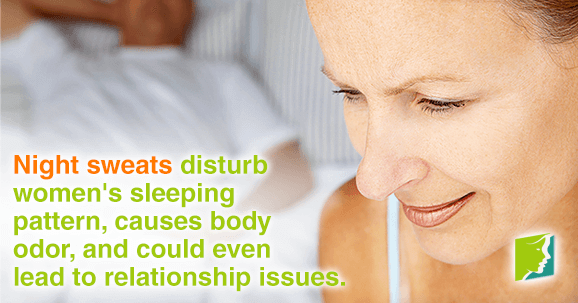Night sweating is a common occurrence in women approaching menopause. During perimenopause, changes in hormone levels cause internal body temperature to increase, to which the body responds by producing sweat to cool down. But sweating episodes aren't a condition in themselves, so is it really that important to address them? Actually, it is. Sweating episodes can sometimes be indicative of other underlying health concerns outside of menopause. Night sweats also disturb and woman's sleeping pattern, cause body odor, and could even lead to relationship issues if undealt with.
Night Sweats: Menopausal or Something More?
It's fairly well-publicized that menopause can cause night sweating episodes to occur, but this means that a woman may automatically assume that her sweating episodes are menopausal and overlook other possible causes. Night sweats can be a symptom of many disorders, including tuberculosis, fever, sleep apnea, thyroid disorders, human immunodeficiency virus (HIV), and certain types of cancer in most cases, night sweats can be attributed to menopausal hormonal imbalance, it is worth considering any unusual symptoms you have experienced alongside sweating episodes. If you are concerned, arrange a consultation with your doctor to rule out serious medical issues.
Sweating and Sleep
Extreme temperature changes and unpleasant clamminess are both likely to awaken a woman from sleep. In severe cases, she may need to use cold water to cool down or even change her nightwear as a result of sweating. Even in mild cases, awakening after a sweating episode is disruptive to restful sleep. Adults require between six and eight hours of sleep per night to ensure energy and concentration levels during the day. Tiredness weakens the immune system, making a person more susceptible to disease and infection.
Personal Hygiene
The buildup of bacteria in areas with restricted air access, like the armpits, can cause unpleasant body odor to occur after sweating. It can be difficult to detect one's own body odor, which is problematic because personal hygiene is an issue that can impact a person's professional, social, and intimate life.
Relationship Issues
If you share your bed with a partner, it is inevitable that they will be affected by your sweating episodes. Your partner's sleeping pattern is likely to be interrupted by your activity during the night, which can result in their tiredness and frustration as well as your own. What's more, clamminess and odor caused by sweating could impede upon your sex life or your partner's experience of sharing a bed with you. If issues caused by sweating force you to sleep in a separate bed from your partner, this could result in emotional distance.
Although night sweats are not a condition in themselves, this is not a reason to ignore them; on the contrary, they could symptomize more worrying health concerns than menopause, so it's important to take them seriously and look for natural ways to treat them. Menopausal sweating episodes should be addressed to ease comfortable, restful sleep - for you and your partner - without clamminess or odor impeding that. Do not underestimate the importance of a good night's sleep in helping you function at your best during the day.
Sources
- Dall, L. & Stanford, J.F. (1990). Fever, Chills, and Night Sweats. In: Clinical Methods: The History, Physical, and Laboratory Examinations. 3rd ed. Retrieved from http://www.ncbi.nlm.nih.gov/books/NBK324/
- National Health Service UK. (2012). Night sweats. Retrieved March 24, 2014, from http://www.nhs.uk/conditions/night-sweats/Pages/Introduction.aspx
- National Institutes of Health. (2011). Sweating: MedlinePlus Medical Encyclopedia. Retrieved March 24, 2014, from http://www.nlm.nih.gov/medlineplus/ency/article/003218.htm
- Stanford University. (1998). Sleep hyperhidrosis (night sweats, excessive sweating). Retrieved March 24, 2014, from http://www.stanford.edu/~dement/sweats.html




